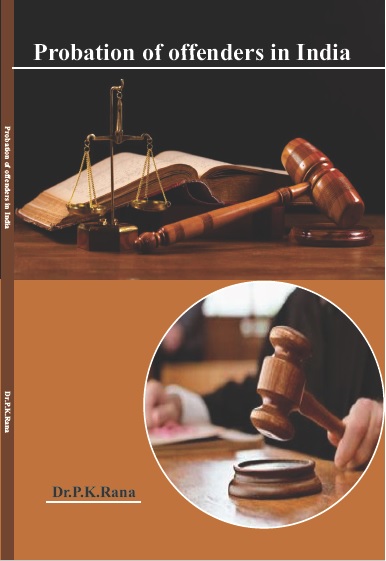SOCIAL SCIENCE AND HUMANITIES

Probation Of Offenders In India
by Dr.P.K.Rana
ISBN Number : 978 - 1- 73033 - 815 - 1
Authors Details
| Author Name | Image | About Author |
|---|---|---|
| Dr.P.K.Rana |  |
Dr.P.K.Rana teaches Law in M.S.Law college Cuttack (Odisha),Which is constituent college of Utkal
University, Vanivihar(Odisha) and has been teaching Indian Penal Code, Criminology and Penology,
victim logy , Environmental Law and Law and social transformation etc. to the LL.B(H) and LL.M
students. To his credit he has secured First class first in the Master degree of Law examination. He
obtained his Ph.D degree on the topic “Bonded Labour in Odisha”. He has contributed several Articles
on legal topics in leading law journals in India. |
Book Description
Probation is to be viewed both as a sentence of the court and as a correctional process. In the former sense, it combines the suspension of sentence against convicted offenders and while in the later sense it includes pre-sentence investigations as an aid to court's disposition. Thus, probation involves the conviction of a crime, the selection of cases for this disposition, the suspension of sentence for a specified period of time and the avoidance of imprisonment, the imposition of conditions as a limitation on the freedom of the offender and as a basis for possible revocation and the control and treatment of the individual in the community. It is a system of releasing criminals on suspended sentence and which has been evolved first time in U.S.A. and crossing numerous geographical boundaries. In India, this short of practice came to be recognized under the British Raj in the shape of Section 562 of Code of Criminal Procedure, 1898(old) and later on in Section 360 of new Cr.P.C. 1973. Subsequently the Central Government of India took the initiative to enact the Probation of Offenders Act, 1958. It permits probational release of all offenders (irrespective of age and sex) except those who are liable to be given capital punishment for murder, treason, etc. and to dacoits and professionals. But under J.J.Act, 2000 makes the release of all juvenile offender on probation obligatory and which has its root at common law where children were granted some exemption from responsibility for infancy, based upon presumptions relating to their capacity to entertain a criminal intent. Thus, infants and young children under the age of 7 years were deemed incapable of committing crime (doli in capax) but thereafter upto the age of 12 years responsibility was determined by the individual's understanding and judgment (doli capax). To save a child from becoming a criminal, or from continuing in a career of crime to end in mature years in jail and disgrace, the Central Legislature off late provides the salvation of such children by enacting The Juvenile Justice (Careand Protectionof Children) Act, 2015. The author would like to express his immense source of gratitude to his junior colleagues Dr. G.R.Sahoo, Lecturer, P.G. Department of Law, Utkal University, Vani Vihar, Bhubaneswar, Odisha without whose guidance, participation and co-operation the work would not have been completed. The author is very much obliged to Mr. D.Mahakul, who has taken so much pain in computerizing the manuscript. I am grateful to my wife Sunity, who willingly gave up the time which would have been her, in order to see the completion of this work. In the end, I dedicate this book to my loving parent, who are the source of enlighten not only tome but to our entire family. Their sacrifice, devotion, dedication and painstaking efforts have been instrumental in enabling me to undertake higher studies in law.














